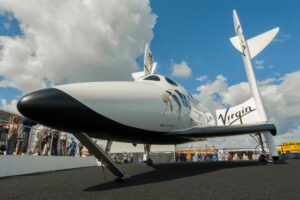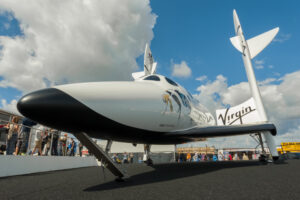
Last year, when Josh Western and Andrew Bacon set up their company Space Forge, they had a garage to work in and little else.
Today, the two Cardiff-based entrepreneurs have a staff of 25 and are now planning further expansion after raising £7.6m of international seed-funding.
The financing – to be announced later this week – should allow the company to start a remarkable aerospace endeavour: deploying satellites in which new alloys, medicines and semiconductors can be manufactured in outer space and then brought back to Earth. The first missions are now planned for the end of 2022.
“Earth is a wonderful place to live on but terrible for manufacturing so many things,” said Western. “You have to fight gravity and the dense atmosphere while trying not to cause pollution. But in space you have no gravity to interfere with the mixing of materials, while you have a pure vacuum and no atmospheric pollution. And you also turn your instruments towards or away from the Sun to heat or cool them rapidly.”
Getting into space is the issue. Space Forge, which has already received backing from the UK Space Agency and the European Space Agency, believes its reusable factories will provide the answer. These oven-sized craft, called ForgeStar orbital vehicles, will be launched into orbit more than 300 miles above Earth.
They will exploit the simple launch systems that aerospace companies such as Virgin Orbit are developing. Small rockets are carried into the upper atmosphere on jumbo jets and then fired into space. Once in orbit, ForgeStar vehicles will circle Earth for one to six months. Inside the little craft, automated robotic systems will direct the manufacturing and testing of alloys, pharmaceuticals and electronic components that cannot be made on Earth.
It should transform the way materials are manufactured in microgravity. “Experiments on the International Space Station have shown the value of space manufacture,” said Western. “Fluoride glass fibres used in communication systems provide an example. Made on Earth, they tend to be a bit cloudy. Those made on the space station are crystal clear and 10 to 100 times better at transmitting signals.
“Our ForgeStar vehicles are designed to make materials like that.”
This week, Space Forge will release details of the finances it has raised from US, UK and other investors, including the US-based SpaceFund and the Berlin-based World Fund, which backs companies pioneering new green technologies. “Clearly, international investors are impressed,” said Paul Bate, chief executive of the UK Space Agency. “The investment was four times oversubscribed and millions of pounds secured to support the company on the next steps of its journey.”
This point was backed by Western. “Hopefully, we will now be able to get our first ForgeStar into space by the end of 2022.”
Read more:
UK space firm secures £7.6m to fund trial of factory satellites
